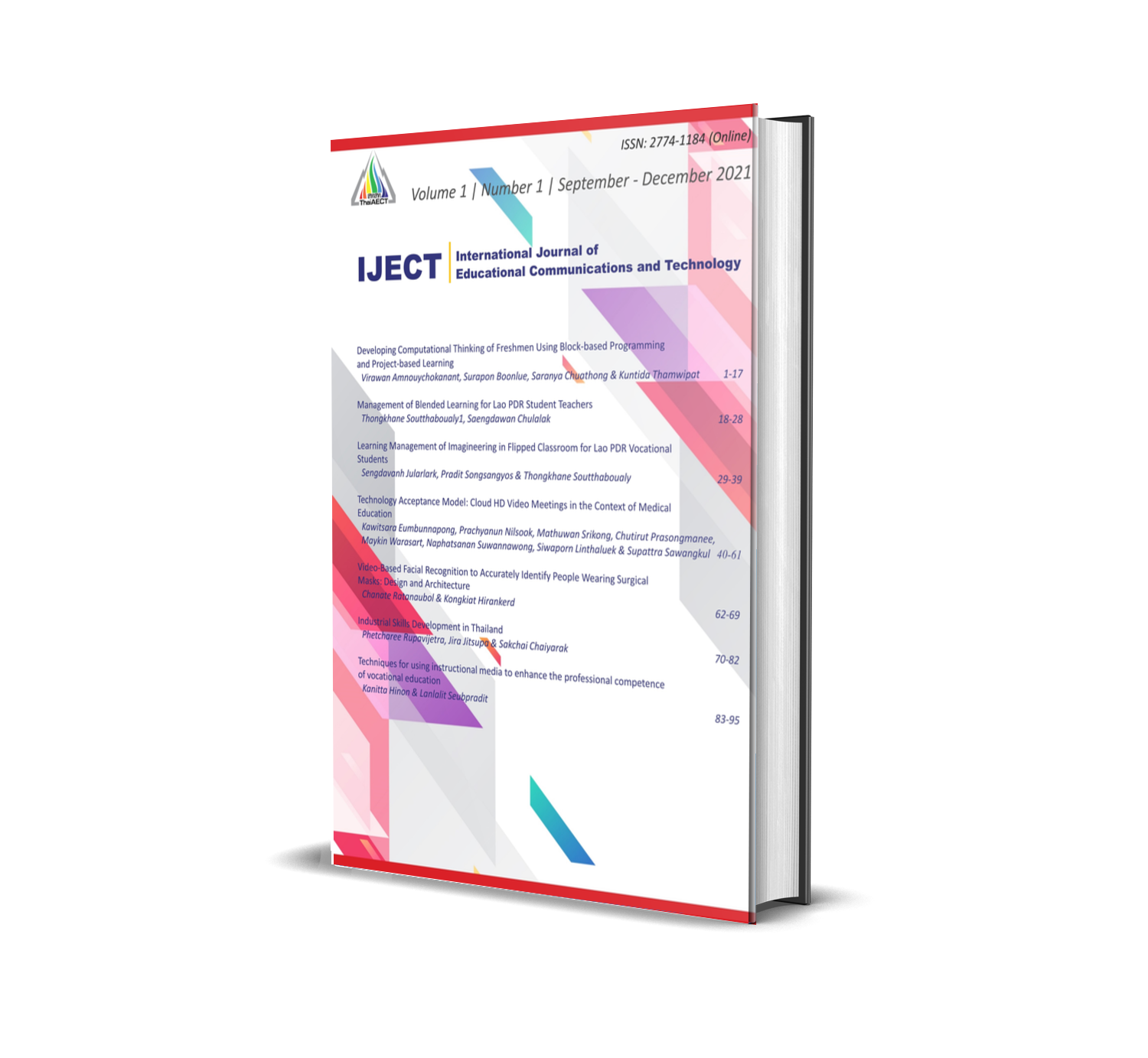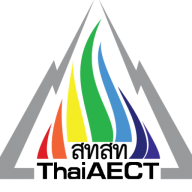Techniques for using instructional media to enhance the professional competence of vocational education
Keywords:
Online Learning, Instructional Media, Vocational EducationAbstract
The Covid-19 situation has forced vocational colleges to change their teaching and learning management. Vocational learning materials are set to operate in accordance with four main policies: On-site, On-air, Online and On-demand. There will be additional from the policy of the Ministry of Education in the section called On-hand. In addition, the techniques for using learning materials in various ways were also formulated into the four types of learning management methods. This is to ensure that the teaching and learning in vocational education can be carried out effectively, upgrading the learning management based on the competency of vocational education to be able to operate continuously.
References
Office of the Vocational Education Commission. (2012). Project-based Learning Manual. Bangkok: The Office of Vocational Education Commission, Thailand’s Ministry of Education.
Chan-o-cha, P. (2017, January). Thailand 4.0 means Opportunity Thailand. Thailand Investment Review, 1–3. Chatwattana, P., & Nilsook, P. (2017). A web-based learning system using project-based learning and Imagineering. International Journal of Emerging Technologies in Learning, 12(5). https://doi.org/10.3991/ijet.v12i05.6344
DeJarnette, N. K. (2018). Implementing STEAM in the Early Childhood Classroom. European Journal of STEM Education, 3(3), 1–9. https://doi.org/10.20897/ejsteme/3878
Huang, R. H., Liu, D. J., Guo, J., Yang, J. F., Zhao, J. H., Wei, X. F., … Chang, T. W. (2020). Guidance on flexible learning during campus closures: Ensuring course quality of higher education in COVID-19 outbreak. Smart Learning Institute of Beijing Normal University.
Joosten, T., Lee-McCarthy, K., Harness, L., & Paulus, R. (2020). Digital Learning Innovation Trends. Retrieved from https://files.eric.ed.gov/fulltext/ED603277.pdf
Kummanee, J., Nilsook, P., & Wannapiroon, P. (2020). Digital learning ecosystem involving steam gamification for a vocational innovator. International Journal of Information and Education Technology, 10(7), 533–539. https://doi.org/10.18178/ijiet.2020.10.7.1420
Li, H., Kim, M. K., & Xiong, Y. (2020). Individual Learning Vs. Interactive Learning: A Cognitive Diagnostic Analysis of MOOC Students’ Learning Behaviors. American Journal of Distance Education, 34(2), 121–136. https://doi.org/https://doi.org/10.1080/08923647.2019.1697027
Monkeviciene, O., Autukeviciene, B., Kaminskiene, L., & Monkevicius, J. (2020). Impact of innovative STEAM education practices on teacher professional development and 3-6-yearold children’s competence development. Journal of Social Studies Education Research, 11(4), 1–27.
Nilsook, P., Chatwattana, P., & Seechaliao, T. (2021). The Project-based Learning Management Process for Vocational and Technical Education. Higher Education Studies, 11(2), 20–29. https://doi.org/10.5539/hes.v11n2p20
Nilsook, P., Utakrit, N., & Clayden, J. (2014). Imagineering in Education: A Framework to Enhance Students’ Learning Performance and Creativity in Thinking. Educational Technology, 54(1), 14–20.
OECD. (2021). The importance of vocational education and training in the Thai education system and labour market. In Vocational Education and Training in Thailand (pp. 10–35). Paris: OECD Publishing. https://doi.org/10.1787/fdbf850d-en
Prihantoro, C. R. (2020). Vocational High School Readiness for Applying Curriculum Outcome Based Education (OBE) in Industrial 4.0 Era, 12(1), 251–267.
Puriwat, W., & Tripopsakul, S. (2020). Preparing for industry 4.0-will youths have enough essential skills?: An evidence from Thailand. International Journal of Instruction, 13(3), 89–104. https://doi.org/10.29333/iji.2020.1337a
Qin, Y., Huang, Z., Yu, J., Qing, P., Lui, S., & Liu, R. (2020). Practice-Based Learning Using Smart Class: A Competency-Based Model in Undergraduate Radiology Education. Academic Radiology, November(3), 1–8. https://doi.org/10.1016/j.acra.2020.09.028
Rintala, H., & Nokelainen, P. (2020). Vocational Education and Learners’ Experienced Workplace Curriculum. Vocations and Learning, 13(1), 113–130. https://doi.org/10.1007/s12186-019-09229-w
Rujira, T., Nilsook, P., & Wannapiroon, P. (2021). Vocational Education Digital Enterprise Architecture Framework (VEDEAF). In 2021 9th International Conference on Information and Education Technology, ICIET 2021 (pp. 63–67). https://doi.org/10.1109/ICIET51873.2021.9419576
Sanglub, A., Nilsook, P., & Wannapiroon, P. (2019). Imagineering on augmented reality and digital twin for digital competence. International Journal of Information and Education Technology, 9(3). https://doi.org/10.18178/ijiet.2019.9.3.1201
Sethakul, P., & Utakrit, N. (2019). Challenges and future trends for Thai education: Conceptual frameworks into action. International Journal of Engineering Pedagogy, 9(2), 8–16. https://doi.org/10.3991/ijep.v9i2.10220
Techakosit, S., & Nilsook, P. (2016). The learning process of scientific imagineering through AR in order to enhance STEM literacy. International Journal of Emerging Technologies in Learning, 11(7). https://doi.org/10.3991/ijet.v11i07.5357
The office of the education council. (2016). National Education Plan 2017 –2036. Bangkok: Ministry of Education, Thailand.
Vandeweyer, M., Espinoza, R., Reznikova, L., Lee, M., & Herabat, T. (2021). Thailand’s education system and skills imbalances: Assessment and policy recommendations. OECD Economics Department. Organisation for Economic Co-operation and Development. https://doi.org/10.1787/b79addb6-en
Wannapiroon, P., Nilsook, P., Jitsupa, J., & Chaiyarak, S. (2021). Technology acceptance of online instruction for vocational instructors in new normal education. World Journal on Educational Technology : Current Issues, 13(4), 635–650. https://doi.org/10.18844/wjet.v13i4.6234
Wannapiroon, P., Nilsook, P., Jitsupa, J., & Chaiyarak, S. (2022). Digital Competences of Vocational Instructors with Synchronous Online Learning in Next Normal Education. International Journal of Instruction, 15(1), 293–310.
Wannapiroon, P., Nilsook, P., Techakosit, S., & Kamkhuntod, S. (2021). STEM Literacy of Students in Vocational Education. International Journal of Technology in Education and Science, 5(4), 527–549. https://doi.org/https://doi.org/10.46328/ijtes.253
Wanotayapitak, S., Saraubon, K., & Nilsook, P. (2019). Process design of cooperative education management system by cloud-based blockchain E-Portfolio. International Journal of Online and Biomedical Engineering, 15(8). https://doi.org/10.3991/ijoe.v15i08.10374
Downloads
Published
How to Cite
Issue
Section
License
Copyright (c) 2021 International Journal of Educational Communications and Technology

This work is licensed under a Creative Commons Attribution-NonCommercial 4.0 International License.







